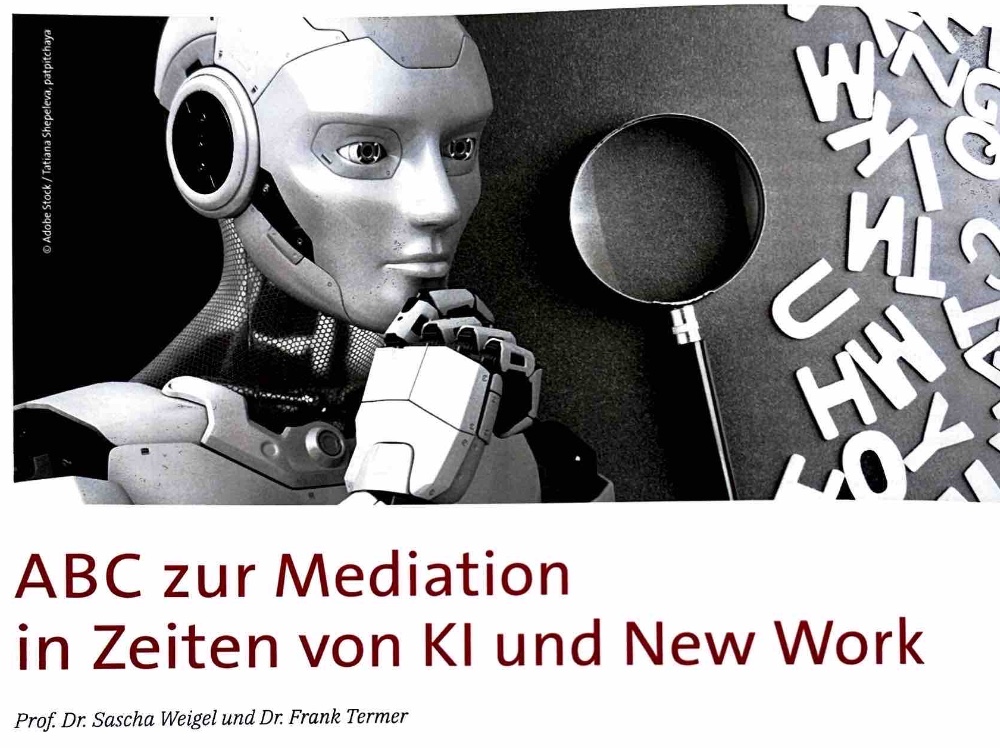Essay: ABC of mediation in times of AI and New York
in: Spektrum der Mediation 95/2024, p. 20-23
Dr Sascha Weigel & Frank Termer
Summary
This glossary provides easy-to-understand explanations of key terms related to artificial intelligence and new work. The aim is to build a bridge to mediation in order to convey an understanding of the influence of AI and New Work on the way mediators work.
Extracts
A
Agility describes the ability to be flexible and adaptable in a rapidly changing world. In the context of New Work, agility refers to the willingness of organisations to continuously adapt processes, structures and working methods in order to respond to changing requirements and market conditions. It is important for mediators in conflicts whose conflict parties work in an agile manner to understand these working methods. In mediation itself, agile working methods can sometimes help to make conflict resolution and negotiations more efficient and effective.
B
Big data refers to the immense amount of digital information generated in today's connected world. This data includes everything from text and images to numbers and sensor data. The importance of big data in the context of AI and New Work lies in the fact that these data volumes are often too large and complex to be processed by humans alone. AI algorithms are used to gain valuable insights from this data and make well-founded decisions.
C
Cloud computing refers to the provision of IT services via the internet. Instead of using local servers and data centres, organisations access remote servers to store data and run applications. This enables a flexible and scalable IT infrastructure, which is particularly beneficial in the world of AI and New Work. Mediators can use cloud tools to support conflict resolution processes, securely store documents and collaborate on solutions, regardless of their location.


L
Leadership refers to the ability to lead, inspire and influence others to achieve common goals. In recent years, leadership has changed in order to meet the demands of generations Y and Z. They value open communication, co-determination and meaning in their work. Modern leadership favours collaboration, flexibility and continuous learning. These changes are closely linked to the promotion of agility in organisations.
M
M i n d s e t encompasses a person's mindset and attitude towards themselves, their work and their environment. In the context of New Work, an agile, flexible mindset is important as it promotes a willingness to change, continuous learning and adaptation of working methods. This also influences the perception of conflict. An open and cooperative mindset enables constructive conflict resolution, promotes communication and the ability to develop. In the modern working world, a flexible mindset is crucial for agility and adaptability.
N
New working models are innovative approaches that are changing the way people and organisations work in the modern working world. They emphasise flexibility, work-life balance and the use of technology to optimise the work process. These include remote working, job sharing and self-organised teams. New working models can influence conflicts as they create different working environments and communication channels. Mediators should understand these dynamics to ensure effective solutions in modern work contexts.


X
Explainable AI (XAI) refers to the ability of AI and machine learning models to explain their decisions and predictions in an understandable way. This is particularly important as many AI models use complex algorithms that are difficult for humans to understand. XAI is becoming increasingly important as employees need to be able to understand how AI systems arrive at their decisions, especially in sensitive areas such as HR management.
Y
Young professionals are young adults who have just completed their education and are entering the world of work. This group is characterised by their energy, enthusiasm and striving for professional success. Young professionals are generally well educated and bring fresh ideas and new perspectives to the world of work. Their needs and expectations, particularly with regard to work-life balance and career development, influence the work culture and strategies of companies to cater to Generations Y and Z as well.
Z
Visions of the future refer to the ideas and goals that people have for the future development of technologies, the world of work and the labour market.
society. These visions are crucial for driving innovation and shaping positive change. They are of great importance as they set the direction for the development of working models and technologies. They influence the strategies of companies and organisations as well as the design of the world of work. Ideas about the future are important because they directly influence the decisions of the present.





Leave A Comment